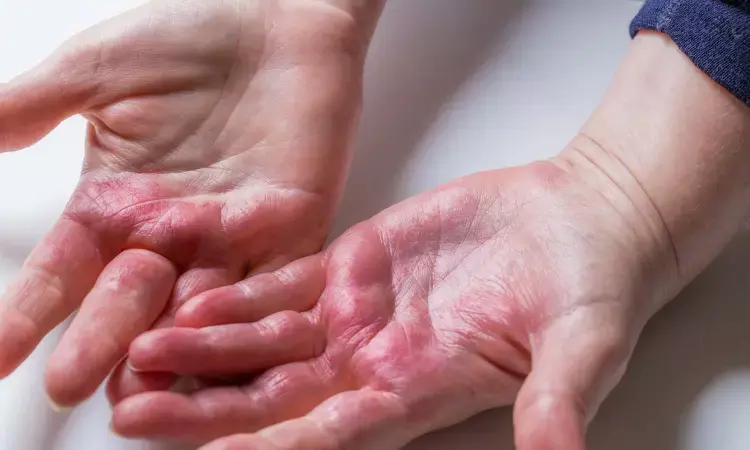- Home
- Medical news & Guidelines
- Anesthesiology
- Cardiology and CTVS
- Critical Care
- Dentistry
- Dermatology
- Diabetes and Endocrinology
- ENT
- Gastroenterology
- Medicine
- Nephrology
- Neurology
- Obstretics-Gynaecology
- Oncology
- Ophthalmology
- Orthopaedics
- Pediatrics-Neonatology
- Psychiatry
- Pulmonology
- Radiology
- Surgery
- Urology
- Laboratory Medicine
- Diet
- Nursing
- Paramedical
- Physiotherapy
- Health news
- Fact Check
- Bone Health Fact Check
- Brain Health Fact Check
- Cancer Related Fact Check
- Child Care Fact Check
- Dental and oral health fact check
- Diabetes and metabolic health fact check
- Diet and Nutrition Fact Check
- Eye and ENT Care Fact Check
- Fitness fact check
- Gut health fact check
- Heart health fact check
- Kidney health fact check
- Medical education fact check
- Men's health fact check
- Respiratory fact check
- Skin and hair care fact check
- Vaccine and Immunization fact check
- Women's health fact check
- AYUSH
- State News
- Andaman and Nicobar Islands
- Andhra Pradesh
- Arunachal Pradesh
- Assam
- Bihar
- Chandigarh
- Chattisgarh
- Dadra and Nagar Haveli
- Daman and Diu
- Delhi
- Goa
- Gujarat
- Haryana
- Himachal Pradesh
- Jammu & Kashmir
- Jharkhand
- Karnataka
- Kerala
- Ladakh
- Lakshadweep
- Madhya Pradesh
- Maharashtra
- Manipur
- Meghalaya
- Mizoram
- Nagaland
- Odisha
- Puducherry
- Punjab
- Rajasthan
- Sikkim
- Tamil Nadu
- Telangana
- Tripura
- Uttar Pradesh
- Uttrakhand
- West Bengal
- Medical Education
- Industry
Rocatinlimab shows promising long-term results for Moderate to Severe Atopic Dermatitis: Lancet

Rocatinlimab is a novel, patient-tailored monoclonal antibody therapy. Role of rocatinlimab as a safe and effective treatment for atopic dermatitis is largely unknown.
Mount Sinai researchers have found in a phase 2b multicenter, double-blind, placebo-controlled study that Rocatinlimab exhibits promising long-term results for Moderate to Severe Atopic Dermatitis.Further rocatinlimab showed promising results both while taking the drug and up to 20 weeks after the therapy was stopped.
The research has been published in The Lancet.
The researchers said the results indicate that rocatinlimab has the potential to change the genetic makeup of a person's atopic dermatitis for the long term, and possibly help sustain lasting results without continued use. Rocatinlimab inhibits OX40-an immune molecule involved in activating inflammatory cells that play a key role in the development of atopic dermatitis and other inflammatory diseases.
"Atopic dermatitis, the most common type of eczema, is a debilitating chronic inflammatory skin disease that affects 1 in 10 Americans and millions of people worldwide," said Emma Guttman, MD, PhD, Waldman Professor and System Chair, The Kimberly and Eric J. Waldman Department of Dermatology; Director, Center of Excellence in Eczema; and Director, Laboratory of Inflammatory Skin Diseases, at the Icahn School of Medicine at Mount Sinai. "It often develops at a very young age, causing the skin to become inflamed, red, extremely itchy, painful, and very dry-all symptoms that greatly affect a patient's quality of life. We are very optimistic about the results of this trial and the potential for disease modification and long-lasting effects to improve patients' quality of life."
In this phase 2b multicenter, double-blind, placebo-controlled study, 274 patients were recruited and (rocatinlimab: n=217; placebo: n=57) randomly assigned 1:1:1:1:1 to rocatinlimab every four weeks (150 mg or 600 mg) or every two weeks (300 mg or 600 mg) or subcutaneous placebo up to week 18, with an 18-week active-treatment extension and 20-week follow-up. This trial was conducted at 65 sites within the United States, Canada, Japan, and Germany.
Percent change from baseline in the Eczema Area and Severity Index (EASI) score was assessed as the primary endpoint at week 16, and significance versus placebo was achieved with all active rocatinlimab doses (-48% to -61%) doses compared to placebo (-15%). All active dose cohorts also continued improving after week 16, and most patients maintained the response for at least 20 weeks off treatment.
The results support rocatinlimab as a safe and effective treatment for moderate to severe atopic dermatitis, with potentially long-lasting efficacy and disease modification. Adverse events reported were generally similar between rocatinlimab groups. Common adverse events during the double-blind period included fever, chills, headache, aphthous ulcers (canker sores), and nausea.
"At week 36, all participants had been on the treatment for at least 18 weeks," added Dr. Guttman, senior author of the study. "By this time, we saw that while the drug achieved the primary endpoints in all doses versus the placebo, it's also a drug that improves over time, which is really unusual and unique among currently available treatment options."
Researchers plan to continue this investigation in a phase 3 program in 2023. Future studies will also include a larger study population, longer follow-up, and exploration of combination therapy (such as rocatinlimab plus topical corticosteroids).
Reference:
Prof Emma Guttman-Yassky, Prof Eric L Simpson, Prof Kristian Reich, Prof Kenji Kabashima, Prof Ken Igawa, Tetsuya Suzuki, Hirotaka Mano, Takeshi Matsui, Ehsanollah Esfandiari, Prof Masutaka Furue, Published:December 09, 2022. DOI:https://doi.org/10.1016/S0140-6736(22)02037-2
Dr Kamal Kant Kohli-MBBS, DTCD- a chest specialist with more than 30 years of practice and a flair for writing clinical articles, Dr Kamal Kant Kohli joined Medical Dialogues as a Chief Editor of Medical News. Besides writing articles, as an editor, he proofreads and verifies all the medical content published on Medical Dialogues including those coming from journals, studies,medical conferences,guidelines etc. Email: drkohli@medicaldialogues.in. Contact no. 011-43720751


